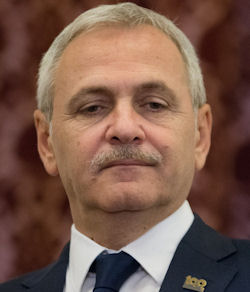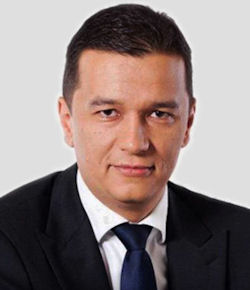Sorin Grindeanu - 04 Jan 2017 - 21 Jun 2017
 The 11 December 2016 elections were held according to new rules, following an amendment to the constitution lowering the number of parliamentarians to 134 senators, 308 deputies, 18 minority deputies, and 6 representatives of Romanians abroad for a total of 466 members. The Social Liberal Union consisted of the Social Democratic Party (PSD), the National Liberal Party (PNL), the Conservative Party (PC), and the National Union for the Progress of Romania. The Right Romania Alliance (ARD) consisted of the Democratic-Liberal part (PD-L), the National Peasant Christian-Democratic Party (PNT-CD), and the Civic Force (FC).
The 11 December 2016 elections were held according to new rules, following an amendment to the constitution lowering the number of parliamentarians to 134 senators, 308 deputies, 18 minority deputies, and 6 representatives of Romanians abroad for a total of 466 members. The Social Liberal Union consisted of the Social Democratic Party (PSD), the National Liberal Party (PNL), the Conservative Party (PC), and the National Union for the Progress of Romania. The Right Romania Alliance (ARD) consisted of the Democratic-Liberal part (PD-L), the National Peasant Christian-Democratic Party (PNT-CD), and the Civic Force (FC).
Romania's new Parliament convened 20 December 2016, the first time since elections amid concerns that the country's vaunted anti-corruption fight may weaken under a new government. The left-leaning Social Democrats easily won the Dec. 11 parliamentary elections, but did not secure a majority. Party leader Liviu Dragnea was banned from being prime minister because he had a conviction for electoral fraud. The Social Democrats said they would form a coalition government with a minority partner.
Dragnea himself was forbidden by law to take office following a conviction for electoral fraud and a trial over his misuse of office. But he had a simple solution, hoisting political loyalists and the pseudo-liberal junior coalition partner ALDE into the cabinet while the actual business of running the government would be conducted through PSD officials.
Romania’s Social Democratic Party (PSD) proposed former communications minister Sorin Grindeanu for the Prime Minister’s seat on 28 December 2016. This was PSD’s second proposal for this position, after President Klaus Iohannis refused the previous day to appoint Sevil Shhaideh, the party’s first proposal. Shhaideh, a close associate of PSD leader Liviu Dragnea, was ruled out of the job by his criminal sentence in a 2012 referendum-rigging case. The head of the Social Democrats, Liviu Dragnea, had been sentenced for electoral fraud and was confronted by further accusations of illegality. But as parliamentary president, Dragnea controlled his Cabinet's every step.
Many ministers and other officials, including the responsible minister of the interior, come from the region where Dragnea governed like a "local baron" — as Romanian media often call corrupt politicians and businesspeople — as head of the district council. These people are fully devoted to their "master" with eternal loyalty. Under the guise of parliamentary democracy, they have gradually brought the judiciary and state institutions under their control.
 Romania's Parliament on 04 January 2017 approved a left-leaning government led by Sorin Grindeanu, who vowed to stop thousands of Romanians emigrating, build highways and encourage the consumption of local produce to create what he called “a normal Romania.”
Romania's Parliament on 04 January 2017 approved a left-leaning government led by Sorin Grindeanu, who vowed to stop thousands of Romanians emigrating, build highways and encourage the consumption of local produce to create what he called “a normal Romania.”
The Romanian Government’s emergency ordinance to change the Penal Code decriminalized or and reduced the criminal punishments for corruption offences such as abuse of office, conflict of interest, and negligence at work. The Government unexpectedly adopted this ordinance on the evening of 31 January 2017, in a cabinet meeting that only had the budget project for 2017 on its agenda. The reason, as government supporters never tire of stressing, was to "relieve the country's prisons," which were "bursting at the seams" [Romanian prisons are in no way overfilled, certainly when compared to Italian or Dutch detention facilities].
The decree would help dozens of party members who had been charged or sentenced for corruption and abuse of office. The main changes target the way abuse of office and conflict of interest are defined. The Government has set a RON 200,000 (EUR 44,400) limit under which abuse of office is not considered a crime. Thus, the public administration officials who knowingly breaks the law while carrying out their duties, will only be prosecuted if the caused damage is higher than RON 200,000. The ordinance also reduced the punishment for abuse of office, from 2 to 7 years in jail, to 6 months to 3 years in jail or a fine. Conflict of interest will no longer be prosecuted if the public official’s decisions bring material benefits to a company he benefits from directly.
The way penalties for abuse of office were relaxed made it abundantly clear that the Romanian government knew it has made the illegal, legal. The Government’s decision triggered protests in Romania. Hundreds of thousands of people took to the streets in Bucharest and other large cities, with protests ongoing in front of the Government building in Bucharest. As many people from outside Bucharest want to come, some Bucharesters tried to help them in any way they can. While some decided to share their cars with those who wanted to come to Bucharest, others offer free accommodation in the capital.
It was the biggest protest in the country since the fall of communism in Romania in 1989. The number of protesters in the capital Bucharest on the night of 01 February 2017 was put at 130,000 to 150,000 outside the cabinet building while riot police estimated a further 100,000 to 150,000 had joined similar rallies in 55 other towns and cities across the east European country.
President Klaus Johannis called it a "day of mourning" and vowed to fight for the restoration of the rule of law in Romania "until his last day in office". There was harsh criticism from all sides, including - remarkably – the trade unions, which are traditionally closely connected to the left-wing-nationalist administration.
Romania's government said 04 February 2017 it would withdraw a decree decriminalising minor grant offences, backing down on a controversial plan to water down anti-corruption laws following five days of mass protests across the country. Prime Minister Sorin Grindeanu told a hastily convened news conference that the government would meet to repeal the emergency decree that had raised worries of a retreat in the fight against corruption. "I do not want to divide Romania. It can't be divided in two," Grindeanu said.
The Government led by Sorin Grindeanu survived a no-confidence motion in early February, less than a month after starting its activity. The motion was filed by the opposition parties after the cabinet decided to adopt an emergency ordinance that would have brought important changes to the Criminal Code.
The no-confidence motion against the Government led by Prime Minister Sorin Grindeanu passed the Parliament vote, 21 June 2017, as 241 MPs voted in favor, more than the needed number of votes of 233. This was a first in Romanian politics, as the governing coalition filed the no-confidence motion against its own Government. The coalition made of the Social Democratic Party (PSD) and the Alliance of Liberals and Democrats (ALDE) withdrew the political support for the Government, claiming that the cabinet led by Sorin Grindeanu failed to apply the governing program. As the Prime Minister refused to resign, the coalition filed a no-confidence motion against its own Government.
Prime Minister Sorin Grindeanu reminded his fellow MPs that Liviu Dragnea was the one who proposed him to be Prime Minister and, although he said no at first, he later accepted the proposal because Dragnea “promised he would be my friend.”
Despite coming to power on the back of a thumping election victory in December 2016, Grindeanu lost the support of his own party and was ultimately ousted after barely six months. PSD officials accused Grindeanu and his government of failing to fulfill an ambitious policy and economic reform program. However, insiders claimed that the prime minister was beginning to assert his independence from PSD boss Liviu Dragnea, who is widely acknowledged to pull the strings behind party scenes. Grindeanu added fuel to those claims by refusing to resign, and instead accusing Dragnea of seeking to concentrate all the power in his own hands.
Liviu Dragnea explained why the ruling coalition decided to file this no-confidence motion against its own Government. “The Prime Minister and the Government to whom we jointly entrusted the most ambitious governing program since 1989 did not perform as we had hoped." Dragnea said after "six months in office the government is faring OK-ish. We didn't win 45 percent of the popular vote to settle for that". He was referring to a government performance review that allegedly found it had failed to uphold an ambitious governing program. The review stated that 60 percent of promises made during the election campaign in 2016 had not been fulfilled and that almost 30 percent had only partially been implemented.
|
NEWSLETTER
|
| Join the GlobalSecurity.org mailing list |
|
|
|

